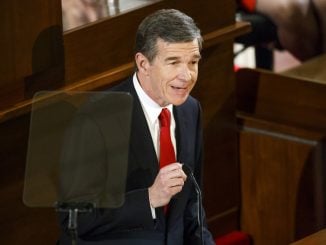After a decade of Republican leadership in the General Assembly, North Carolina was fiscally prepared for COVID-19. The GOP-controlled legislature revamped the Rainy Day Fund back in 2011, accruing over $1.2 billion since then to enhance the meager $4 million left by Democrats.
Perhaps no one benefited more from Republicans’ Rainy Day Fund than Gov. Roy Cooper, an initial opponent of the fund, as its support proved vital in North Carolina’s COVID-19 response. Because of the GOP’s wise foresight, North Carolina is positioned for a strong rebound post-pandemic.
As vaccination spreads, schools reopen, and mandates end, North Carolinians need to rebuild their lives without more unwarranted government interference. But Gov. Cooper’s bloated budget proposal fails to measure up in one critical area: tax relief.
Costing North Carolina taxpayers $27 billion, Cooper’s budget includes millions of dollars for green energy projects, raises for government bureaucrats, and a controversial public school plan that eliminates school choice scholarships. As many families struggle to pay their utility bills, businesses permanently close, and special interests politicize the public school system, North Carolinians would benefit from less government spending and more tax relief.
When North Carolina experienced a budget surplus under Republican Gov. Pat McCrory, our state saw historic tax cuts and the addition of 275,000 jobs. In contrast, Cooper sees the current budget surplus as an opportunity to appease Democrat interest groups. An analyst at the John Locke Foundation refers to Cooper’s proposal as, “a political document designed to score partisan points.” It is hard to argue otherwise when the governor is asking pandemic-weary taxpayers to pay for the rehabilitation of sea turtles and state-funded musical performances.
Cooper’s “COVID-19 recovery” fiscal plan echoes Washington Democrats’ $1.9 trillion partisan package disguised as pandemic relief. It promotes the failed idea that throwing money at a problem will fix it. Over the past fifty years, Americans sent the government $28 trillion to fight poverty, yet it was under President Trump’s low-tax, pro-growth economic policy in which the poverty rate was lowest.
The best way for our economy to rebound is to release the grip of government control and allow citizens to regain full access to their own finances. Last Tuesday, Republicans in the General Assembly filed a bill to reduce the individual income rate and increase standard deductions. Americans across every economic and racial demographic will recover the quickest if they have a state budget that exchanges pointless spending for tax relief.
During the pandemic, Republicans’ control of North Carolina’s State House and Senate provided necessary deterrence against Cooper’s lockdown measures. Republicans exempted businesses in the service industry from burdensome fees, reopened our state’s courthouses and led the effort to return kids to school.
To prevent future governors from mimicking Cooper’s unilateral authority to shut down the entire state for a year, the General Assembly just passed the “Emergency Powers Accountability Act.” The tyrannical nature of one person controlling the economic fates of millions is un-American in principle. To properly restore freedom and fairness in the Tar Heel State, Cooper should significantly lower spending and significantly increase tax cuts so more money can circulate in our state’s economy.
Gov. Cooper’s budget proposal will no doubt be met with critical eyes by Republicans in the state legislature who will champion economic opportunity for North Carolina taxpayers. Following Cooper’s budget rollout, House Speaker Tim Moore (R-Kings Mountain) vowed, “The General Assembly will maintain budget strategies that made our state attractive to so many newcomers with a powerful economy and state government that serves citizens effectively.”
North Carolina is ranked fifth in the nation for long-term financial stability because of GOP fiscal consciousness. We can’t let our guard down now. We urge Gov. Cooper to acknowledge the fiscal responsibility it took for our Rainy Day Fund to carry us through COVID-19.
“Everything is up for negotiation,” Cooper said. We hope he is open to more saving, less spending, and an emphasis on tax relief during this period of recovery.
Michael Whatley is the chairman of the North Carolina Republican Party.



